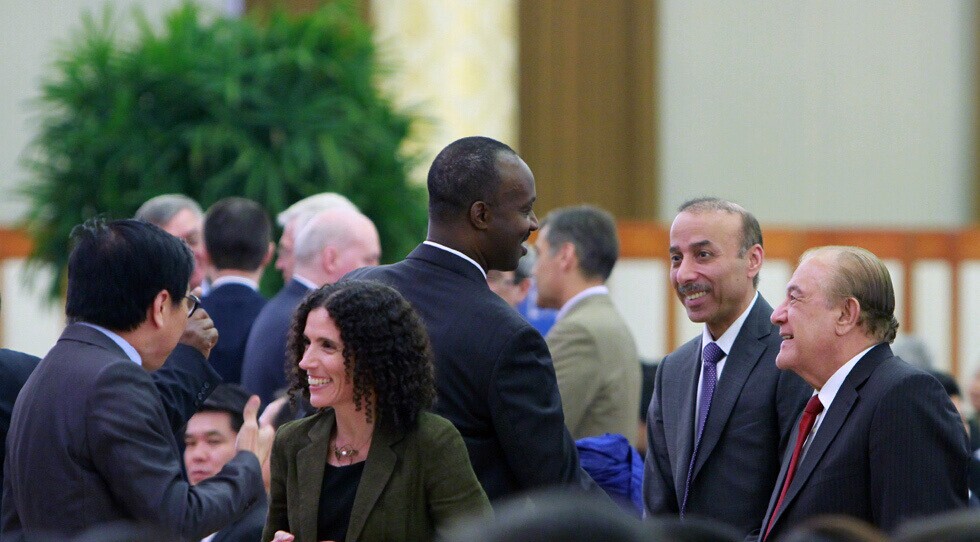'Peaceful coexistence' develops with times

xinhua
Conference marking the 60th Anniversary of the Five Principles of Peaceful Coexistence held at Great Hall of People, Beijing. Participants are greeting each other before the opening of the ceremony.
A ceremony commemorating the 60th Anniversary of the Five Principles of Peaceful Coexistence, China’s long-standing foreign policy guideline, was held in Beijing on June 28 to 29. Chinese President Xi Jinping called for equal sovereignty, common security, sustainable development, cooperation, inclusiveness and justice in his keynote speech. When concluding his speech, Xi announced the Chinese government will set up “Friendship Award of the Five Principles of Peaceful Coexistence” and “Excellence Scholarship of the Five Principles of Peaceful Coexistence”.
Xi’s speech opens the door for a new type of international relations by insisting and promoting the Five Principles of Peaceful Coexistence, scholars say.
In 1954, Premier Zhou Enlai released joint statements with Myanmar and India respectively during his visits to those two countries, ensuring the principles of mutual respect for sovereignty and territorial integrity, mutual non-aggression, non-interference in each internal affairs, equality and mutual benefit and peaceful coexistence as five basic principles to guide China-India, China-Myanmar relations. The statement also emphasized that the Five Principles not only apply to bilateral relations but also to international relations in general. They should lay a solid foundation for peace and security worldwide.
Over the past 60 years, China has been both a practitioner and an advocate for the Five Principles. With the growing strength of China and its expanding foreign relations, China has resolved the boundary issues left from history and established foreign relations with most countries in the world on the basis of the Five Principles, said Zhou Hong, a CASS member of the Chinese Academy of Social Sciences and deputy director of the Academic Division of International Studies at CASS. The Five Principles doctrine has outlasted the Western blockade and containment while amplifying the nation’s voice in international affairs, Zhou added.
Zhao Gancheng, director of the Asia-Pacific Research Center at the Shanghai Institute for International Studies, indicated that the Five Principles has shaped Chinese foreign activities and become a flag of Chinese foreign policy.
Gong Li, from the Central Party School, emphasized that the Five Principles has won more and more recognition and played significant function for maintaining regional stability and world peace.
In a rapidly changing world, the Five Principles demonstrated its strong vitality and flexibility. As Deng Xiaoping once asserted, “To handle international relations, the Five Principles of Peaceful Coexistence is the best solution.”
The Chinese government has increasingly validated the doctrine through practice over the past 60 years, particularly since the reform and opening up. In addition to its application in foreign policy, “peaceful coexistence” has also been used to handle relations among different ethnic groups and nations, noted Pan Guang, president of the Shanghai World History Association. “Peaceful coexistence” means variety, inclusiveness and learning from other cultures’ strengths to supplement shortcomings, which is a new way of thinking for constructing a more solid basis of world peace. Increasing interdependence in the sphere of national security makes it hard for any single country to achieve its goal on its own, Pan said.
In order to cope with this dilemma, China has put forth a new security concept based on the principle of equality and mutual benefit. It has made the transition from cooperative security to mutual trust, mutual benefit and equal collaboration, stressing partnership not alliance, Pan Guang continued.
“Five Principles is a concrete reflection of ‘seeking truth from reality’. It demonstrated that international communications is able to transcend the barriers of ideologies and systems, leading to equality in national relations,” Zhou Hong continued.
China takes an equal attitude toward other countries without distinguishing them as high or low in its foreign relations priorities.
“I believe the egalitarian attitude will generate huge energy for China. Through the practice of equal communication and mutual benefit, China will also build up its strength,” Zhou said.
In recent years, the scope of “mutual respect” has also gradually expanded from respecting sovereignty and territorial integrity to other development models and core interests. Gong Li affirmed that this is the path to truly facilitating peaceful coexistence.
President Xi Jinping declared in his speech, “Under the new international circumstances, the spirit of the Five Principles of Peace, instead of being outdated, remains as relevant as ever. Its significance, rather than diminishing, remains as important as ever. And its role, rather than being weakened, has continued to grow.”
Mutual benefit is the future direction of international relations. Pan Guang said the Silk Road Economic Zone proposed by President Xi fully reflects the notion of mutual benefit, which is a development and new formulation of the Five Principles.
In Zhou Hong’s view, the strategy of “coexistence” develops with the times, opening up numerous windows for international cooperation, for instance, public diplomacy, humanity diplomacy, Party diplomacy, civil diplomacy, military diplomacy and joint enforcement. “The civilization is equal, diversified and inclusive, which is the essence of the Five Principles, opening the possibility for national cooperation and integration”, she said.
The Chinese version appeared in Chinese Social Sciences Today, No. 614, Jun.30, 2014
The Chinese link is: http://www.cssn.cn/zx/bwyc/201406/t20140630_1234868.shtml
Translated by Feng Daimei
